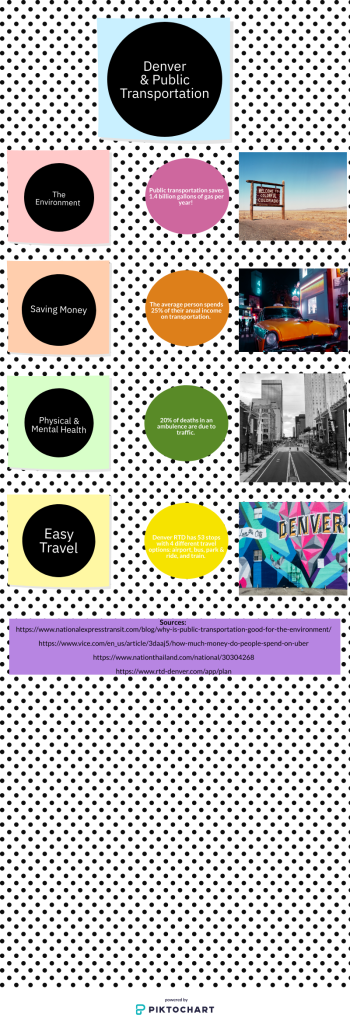The value of the pass DU students have is worth $200.00, however, many students opt to use ride share services like Uber of Lyft.
Many students are unaware that RTD has a partnership as of Jan. 2019 with both Uber and Lyft. The partnership allows users to select public transportation in the app.
In an interview with junior student Joe Osborne, he said, “I think I took the light rail once freshman year. It was fine I just think it is easier to Uber. I went with my girlfriend and she felt like it was sketchy though.”
“Safety is one of our biggest priorities on the rail. We have transit police who are responsible for the wellbeing of passengers and monitoring what is going on in the cars” said Rinker.
The Transit Security Team is responsible for discouraging inappropriate behavior on the trains, and provide a visible presence on the trains. Additionally, these individuals must have experience in security and meet various standards and pass different tests.
In addition to safety, another major focus of RTD is their commitment to protecting the environment.
RTD has made several changes to make them the most environmentally conscious they can be. Buses are required to meet specific emission standards and are frequently tested, the MallRide shuttles are electronically powered, and all RTD transport methods have recycling bins on board.
Rinker stated, “One thing that sets us apart from other ride share companies is that we are incredibly environmentally conscious in all aspects. From things like environmentally friendly paints to recycle bins on boards and at stations, these are things that other companies cannot compete with.”
In a study done by Amanda Sorell, she looks into the shift of cities moving to renewable power for transit.
Her study talks about the various aspects of the ecosystem that benefit as a result of renewable energy being used for public transportation. For instance, it impacts species like butterflies, birds, and other larger animals that feed on vegetation life.
In our society today, there is a greater emphasis on saving the planet now more than ever. Being able to switch to renewable energy to conserve and protect various biodiversity’s is incredibly powerful and impactful.
Public transit has the ability to impact even larger problems than just the environment, it also can benefit those who live in rural areas to have access to urban areas.
In a study done by Barbara Mantel, she looks at the potential harm of those who live far away not having access to strong health care in the city, a higher suicide rate, and a slower commute time in time of emergency because of traffic, RTD has an ability to influence the outcomes of these situations.
In rural areas, the average suicide rate is 19.74%, whereas in an urban area, it is 12.72%. RTD has suicide prevention steps in place, as these transit locations could pose a location for individuals to take their lives.
This can be attributed to a sense of isolation in their community, however, RTD has the ability to bring these individuals into the city.
Having this information made more available to those in rural areas could prevent the amount of deaths by suicide by helping them have easy access to a more populated area, and the amount of deaths in an ambulance as a direct result of too long spent in commute for a hospital.
As a public serving company, RTDs goal is, “dedicated to serve the public and to meet the public needs for a transit agency. We connect you with your community – safely, on time and in clean and accessible vehicles.”
The University of Denver provides students with passes to help them explore their new environment and allow them to enhance their university experience by becoming familiar with their surrounding city.
The Pioneer Card office said in an email interview, “our primary goal of providing students with a pass is to encourage them to expand their horizons off campus and have the ability to travel within the city of Denver efficiently, on a budget, and safely.”
Freshman Andrew Kill says that, “We had to take it once for my FSEM. Even though I have used it before, it just seems easier to call an Uber because it gets me exactly where I need to go.”
Kill also said that the money aspect of it is not incredibly important to him or most of his friends when it comes to simplicity and safety.
“We encourage freshman orientation week leaders to inform students of the benefits of the pass and personal experiences using it. Other than that, we do not have strong marketing efforts devoted to the RTD pass at the moment.”
A potential increase in advertising efforts about the pass to students could motivate and inform students to utilize their RTD passes.
In a phone interview with senior Maddie Hawley, she said, “I wish that I had known more about RTD during college! I did not realize it was able to take me to places like the Coors Brewery, Coors Field, or downtown.”
With over 53 stations, RTD has the ability to bring riders to some of the most popular destinations throughout Denver.
Through a shift from private transportation to using public transit like the light rail or city buses, there are incredible impacts that could be a direct result of an increase in usage, RTD believes.
“Our biggest goal is to serve, and better, the public people of Denver while also leaving a greater impact on things we have an ability to control.”
